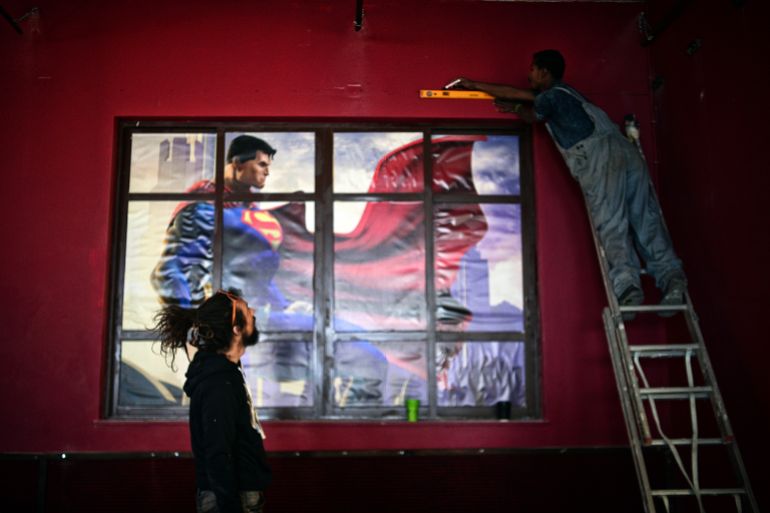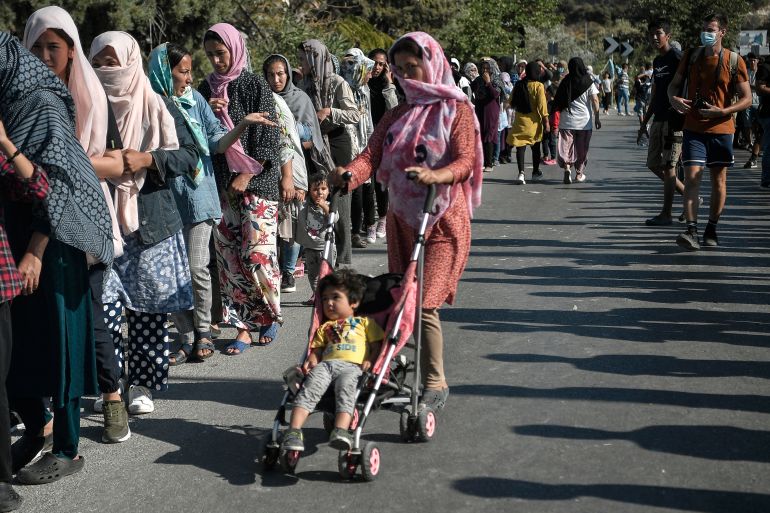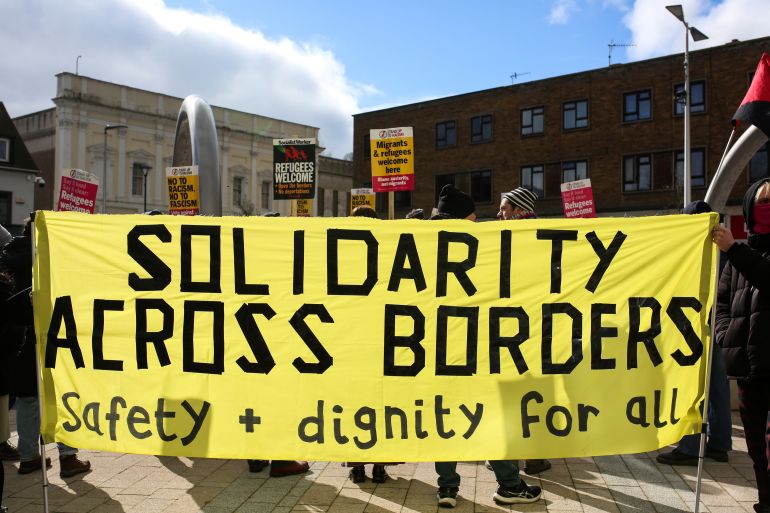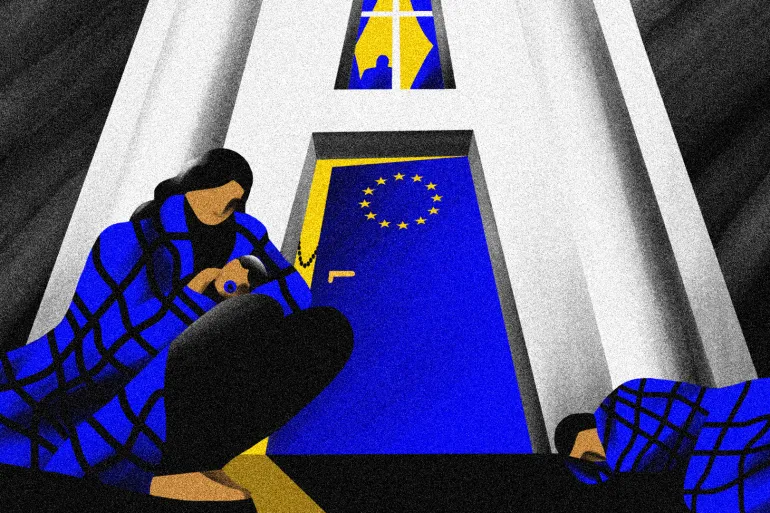People fleeing violence are being driven into extreme poverty by escalating prices — but there is hope.
Towards the end of 2021, governments across Europe had scarcely eased their COVID-19 restrictions when the continent was gripped by a new problem: a cost-of-living crisis caused by soaring prices and low wage growth over the past decade.
From 2022, the war in Ukraine threw global supply chains into further disarray, leading to surging inflation. In January this year, consumer prices in the United Kingdom rose by 10.1 percent and across the eurozone by 8.5 percent.
The crisis has shown no signs of abating. But while there is copious data on how spiralling costs have overwhelmed low-income households across Europe, the scale and nature of their impact on asylum seekers and undocumented people – already victims of systemic inequalities – remain relatively unclear.
There are more than 2 million asylum seekers in the European Union alone, many of whom have undertaken treacherous journeys to escape conflict and persecution from countries like Syria, Iraq and Afghanistan. They often have no access to mainstream financial services and face severe legal and practical barriers to participating in the economy while awaiting decisions on their refugee status.
And in the UK, experts have warned that legislation to stop the entry of people coming to the country through irregular channels and bar them from ever returning again could expose desperate asylum seekers to even more economic and social exploitation.
So just how badly are asylum seekers and undocumented people suffering from the cost-of-living crisis? Are some groups particularly vulnerable? And what can be done to help them?
The short answer: Food poverty and labour exploitation are hitting asylum seekers harder than citizens, researchers and advocacy groups told Al Jazeera. Women, especially mothers, have found their needs falling through the gaps. But these problems can be eased through a number of strategies aimed at socioeconomic integration – and examples of hope already exist.

Work? Sorry. Benefits? Sorry
In the UK, asylum seekers are generally barred from work until they have attained refugee status. If they do not receive an initial decision on their asylum claims within 12 months, they may apply for jobs only on a list determined by the Home Office to be in short supply in Britain, including nurses, social workers and engineers. Although the Home Office says asylum claims are usually processed in six months, the Refugee Council charity published a report in 2021 showing that the average wait time for even an initial decision is likely to be one to three years with some waiting up to five years. Advocacy groups estimate that this waiting time has not decreased since then.
Asylum seekers who report being destitute are provided with accommodation but cannot choose where they live. They are entitled to a 45-pound ($54) weekly allowance to buy essentials. It is an amount that works out to 2,340 pounds ($2,808) a year. This is less than a tenth of the 25,500 pounds ($30,000) that the Joseph Rowntree Foundation, the poverty alleviation charity, recommends as necessary for a minimum acceptable annual standard of living although this sum includes housing, which destitute asylum seekers do not need to pay for.
What’s worse, experts told Al Jazeera, is that there are usually long delays for asylum seekers to receive this allowance. Many wait up to a year.
Likewise, information from the Asylum Information Database indicates that most of the 23 European countries it covers, from Austria to Turkey, do not offer more than small stipends to asylum seekers on top of basic housing and food. Often these stipends are just a fraction of benefits that residents and citizens would get.
For example, in Sweden, one of the wealthiest countries in Europe, an asylum-seeking family with two adults and four children would get 804.69 euros ($859.05) in allowance, compared with the 2,286 euros ($2,440.43) that a “settled” family on social welfare receives. Similarly in the Netherlands, asylum seekers are given 30 percent of the social welfare allowance for Dutch citizens.
Poverty among asylum seekers is compounded by inadequate living conditions in deprived areas and deteriorating mental health owing to uncertainties over their immigration status.
The estimated 681,200 undocumented non-EU citizens living in the bloc are exposed to even greater precarity than asylum seekers because they have no access to benefits.
Among the gravest consequences of this crisis is an epidemic of food poverty.

Fainting from hunger
Apostolos Veizis, executive director at INTERSOS, a non-profit aid organisation based in Athens, said reports of widespread hunger have emerged from the high-security, prison-like facilities housing asylum seekers and refugees in mainland Greece and on the islands of Lesvos, Samos, Kos, Leros and Chios.
INTERSOS mapped some of the most deprived asylum-seeking communities in Greece and started an emergency food programme from December 2021. Members of many of these communities had gone to Athens in the hopes that being in the capital would bring them closer to help after they lost any form of accommodation or food support.
“We’re talking about 60 percent of people in these camps when our project started – men, women and children – with zero access to food who can’t afford to buy essentials,” Veizis said. The NGO also noted a troubling trend of women being forced into prostitution to feed their families. Of the 500 refugees that it supports, more than half are children. Many of them have fainted in school from hunger.
Özlem Ögtem-Young, who is head of research on poverty, precarity, savings and debt at the University of Birmingham in the UK, said charities that are themselves hit hard by the pandemic and the cost-of-living crisis have been struggling to support the increasing numbers of asylum seekers in need of food and clothing.
“There are reports of outbursts at food banks when people are turned away, causing anger, desperation and distress,” she told Al Jazeera. Many charities that have witnessed cuts in funding and resources have been forced to put their services on hold, Ögtem-Young said.
She said her conversations with community organisers have revealed increasing concerns about asylum seekers losing safe spaces where they can find support and also socialise, seek out learning opportunities and gain a sense of belonging.

Servitude and exploitation
Rising prices are likely to force desperate refugees into slavery or trafficking. In the UK, once asylum seekers are given refugee status, there is a 28-day period before all their support comes to an end. A report by the British Red Cross and the UN Refugee Agency in August revealed that futile attempts to secure employment to pay the bills have driven asylum seekers and refugees into domestic servitude, labour exploitation and forced criminality.
Veizis said he has seen increasing numbers of refugees beyond the UK who are forced into exploitative working conditions once their monthly cash assistance as asylum seekers is removed.
“In reality, there is no integration strategy in place to work with refugees,” he said. “One month after asylum seekers get refugee status, they no longer get shelter or support. But just because you’re now a refugee, it doesn’t mean you speak the language or have a job.”
It’s even worse across Europe for those who are undocumented.
“They’re forced to accept transient work in sectors like agriculture, domestic work, construction and catering… with no guarantee that they will be paid at all,” said Michele LeVoy, director of the Platform for International Cooperation on Undocumented Migrants, a Brussels-based umbrella organisation of 164 grassroots groups in 31 European countries.
In fact, their undocumented status often serves as a “bargaining chip for employers, who might threaten to report them to the authorities if they don’t do the same amount of work or even more”, LeVoy told Al Jazeera.

Women more vulnerable
While women and girls account for about 30 percent of asylum applications in Europe, they are more likely than men to have been affected by gender-based violence or rape before and during the migration journey. As such, they have specific healthcare needs that are now harder to fulfil due to increasing costs.
For example, the British charity Maternity Action reported that in 2021, its specialist support line helped 407 pregnant asylum seekers and refugees in the UK who had been erroneously charged for healthcare with fees beginning at around 7,000 pounds ($8,415). Asylum seekers and refugees are legally exempt from healthcare fees charged to foreigners by the National Health Service (NHS).
Pip McKnight, a former community midwife specialising in immigrant maternal health and a teaching fellow at Coventry University, suggested that pregnant asylum seekers might not know how to navigate the healthcare system when they arrive.
“This could be because of difficulties with language or just anxiety over a healthcare system that looks quite different to the one in their home countries,” she said. “And the NHS doesn’t always understand these women’s needs or that they shouldn’t be charged.”
Asylum seekers in the UK are excluded from the state-run Healthy Start scheme, which offers vouchers for fruit and vegetables and milk for low-income pregnant women. That means they end up having to “spend what little allowance they have on these things, … and that obviously makes a huge dent,” McKnight said.
Asylum-seeking and refugee women are also being forced into making difficult sacrifices just to keep their families going, according to Sarah Taal, advocacy and policy director at the Baobab Women’s Project, a grassroots advocacy group in Birmingham, UK.
“Those with pre-existing [health] conditions feel shamed by their doctors for buying processed food instead of fresher options, which they simply can’t afford,” she said. “Mothers are also struggling to prepare nutritious meals or buy clothes for their growing children.”
“We’ve also heard about women starving in order to purchase items needed for their personal hygiene,” Taal said. “This can include shampoo, soap, menstruation products and so on.”

What can be done?
Experts say that it doesn’t have to be this way and some countries are already showcasing potential solutions.
For one, the regularisation of working conditions and social services for asylum seekers and other displaced people in line with those of citizens would help lift many out of poverty. It might also help the economies of host nations.
An argument was made during a parliamentary debate in the UK that lifting the existing ban on asylum seekers’ access to the labour market would save the economy more than 333 million pounds ($400m) a year. That would include about 249 million pounds ($300m) in tax contributions and the rest through savings on some subsistence support that could be reduced for those who find work.
LeVoy cited Ireland as a country showing a positive example. In 2022, Ireland launched a scheme to give the country’s 17,000 undocumented people legal access to its labour market without fearing deportation or arrest. Earlier, during the pandemic, it became the first EU country to offer hardship payments to undocumented non-citizens. Belgium, Luxembourg, Malta and Spain are also making moves towards giving undocumented people the legal right to work.
Experts point to the need for European nations to ensure that subsidies and other help given to help tackle the cost-of-living crisis are also extended to undocumented people seeking refuge.
“Belgium has been offering a 200-euro ($210) reduction for families’ energy bills for those in financial need, and they should ensure that undocumented migrants, who would fall under this category, would not be barred from this measure,” LeVoy said.
For others like Veizis and McKnight, helping asylum seekers and refugees integrate better into their new societies is also a part of the answer.
Instead of spending millions of dollars on camps for refugees and asylum seekers, the Greek government, for instance, could subsidise regular housing for them, Veizis argued. At the moment, such housing is largely unaffordable for refugees: The average monthly rent for a one-bedroom apartment outside the city centre in Athens is around 460 euros ($485).
In the UK, McKnight worked on an initiative in Liverpool last year that brought asylum seekers and refugees into discussions with midwives, psychologists and other medical practitioners to improve perinatal services for them. She is optimistic that such projects make maternal care more accessible and less intimidating.
But for these initiatives and ideas to make a difference, governments across Europe will need to step up, experts said. For millions of asylum seekers and refugees who were already only barely surviving, soaring costs mean time is running out even faster.
Source: Aljazeera















